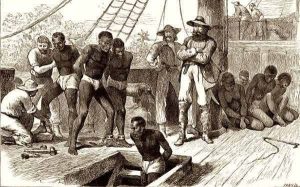
Lloyd’s Register, a British maritime company that provided information about ships involved in the trafficking of African people during slave trade, has apologised for its role in booming the slave economy.
It follows a research into the firm’s link to slavery which found that it played an “important role” in enabling the transatlantic trade, TRT Afrika reported.
About 12 million Africans are estimated to have been forcefully taken from the continent by European nations from the 16th to the 19th century and traded as slaves in cruel circumstances.
The findings published by the Wilberforce Institute at the University of Hull showed how Lloyd’s Register recorded information about the seaworthiness of vessels, which helped those involved in slave trade to buy, sell and insure the ships.
Some of the firm’s founders were also identified as enslavers, while others were involved in the trafficking of enslaved Africans. The research focused on records from 1764 to 1834.
‘Enabled slavery’
“What is clear from this initial research is that, from our founding in 1760 until the UK’s Slavery Abolition Act in 1833, we played an important role supporting a maritime system that enabled the slave economy,” Lloyd’s Register said in a statement on its website this week.
“We are deeply sorry for this part of our history. Acknowledging this legacy is important for our organisation, the descendants of those affected and those who still live with the consequences of this trafficking, and society as a whole,” it added.
The company described Britain as a “major participant in the transatlantic trafficking of enslaved African people”, with British ships making around 10,000 voyages “forcibly taking and transporting about 3.4 million people, 800,000 of whom died in transit”.
Demand for reparations
African leaders have been speaking strongly demanding public apologies and reparations from European countries for atrocities committed against Africans during slave trade.
Britain, Portugal, Netherlands are some of the countries that have apologised for involvement in slavery but have all refused to pay reparations for the atrocities committed.
The failure to pay reparations continue to anger descendants of the enslaved Africans and campaigners both within and outside Africa.
Contrary to the demand for reparations, Lloyd’s Register said it made a grant of £1m to The National Archives for a project to support scholarship in the Caribbean and West Africa for “the development of new narratives surrounding the history of transatlantic slavery”.
”The National Archives is the official archive and publisher for the UK government and for England and Wales and it is the guardian of some of our most iconic national documents, dating back over 1,000 years,” according to its website.
Peoplesmind
